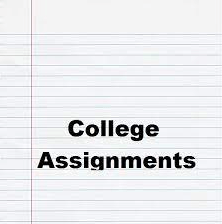What Do I Write My College Assignment On

Are you sitting in front of a blank computer screen, desperately wondering, What do I write my assignment on? Don’t worry; you are not alone! Every student has faced this daunting question at some point during their academic journey. With the countless subjects and topics available for exploration, it is easy to feel overwhelmed and unsure of where to begin. In this article, we will guide you through the process of selecting a college assignment topic that is both engaging and manageable. So, grab your pen and paper (or laptop) as we embark on this exciting quest for inspiration!
The struggle of choosing a college assignment topic
Choosing a college assignment topic can be a daunting task, one that often leaves students feeling overwhelmed and paralyzed with indecision. The struggle lies in finding a topic that not only aligns with their interests and passions but also one that is unique enough to stand out amongst their peers. It becomes a delicate balancing act of considering their strengths and weaknesses, the availability of resources, and the potential for originality. While some may argue that having too many options is a good problem to have, it actually adds an additional layer of anxiety as students question if they are making the right choice.
One fresh perspective on this struggle is to reframe it as an opportunity for personal growth. Rather than viewing the selection process as a burden or obstacle to overcome, students can embrace it as a chance to explore new areas of interest and expand their knowledge base. Approaching this challenge with curiosity allows them to see each potential assignment topic as an avenue for self-discovery and intellectual development.
Research: Gathering information and exploring potential ideas
Research is an essential element of any assignment or project, as it forms the foundation for gathering information and exploring potential ideas. It allows us to delve deep into a topic, uncover hidden insights, and develop a comprehensive understanding. However, research is not just about finding facts; it also involves critically evaluating sources and considering multiple perspectives.
One key aspect of effective research is identifying reliable sources. With the vast amount of information available online, it can be challenging to sort through reputable sources from those that are less trustworthy. Additionally, it’s vital to consider various perspectives on the subject matter to gain a well-rounded understanding.
Personal interests: Identifying topics that align with your passions
When it comes to personal interests, one of the most effective ways to identify topics that align with your passions is through self-reflection. Ask yourself what activities or subjects make you feel energized and excited. Consider the things you naturally gravitate towards in your free time. This could be anything from cooking and hiking to reading about ancient history or exploring new musical genres. By discovering what truly captivates you, you can start to explore related topics that will not only keep you engaged but also allow for growth and learning.
Class themes: Connecting assignment topics to course objectives
When it comes to designing assignments, it is crucial to align them with the overall objectives of the course. By doing so, instructors can ensure that students are not only completing tasks but also actively engaging with class material in meaningful ways. This connection between assignment topics and course objectives serves multiple purposes: it reinforces key concepts, encourages critical thinking and problem-solving skills, and promotes deeper understanding.
One way to achieve this alignment is by incorporating real-world scenarios or case studies into assignments. By presenting students with authentic problems or situations that they may encounter in their future careers, instructors can bridge the gap between theoretical knowledge and practical application. This approach allows students to see how the concepts discussed in class actually play out in real-life situations, making their learning experience more relevant and impactful.
Brainstorming: Generating creative ideas and narrowing down options
Brainstorming is a crucial part of the creative process, helping to generate a wide array of ideas for any given project. However, it can sometimes feel overwhelming when faced with an abundance of options. This is where the process of narrowing down comes into play. Rather than viewing it as a restrictive phase, consider it as an opportunity to refine your ideas and enhance their effectiveness.
One effective strategy for narrowing down options is to analyze each idea based on its feasibility and practicality. Consider factors such as time constraints, available resources, and potential obstacles that may arise. By critically evaluating your ideas in this way, you can weed out those that are less viable and focus on the ones that have the greatest potential for success.
Consultation: Seeking guidance from professors or classmates
One of the most valuable resources in college is the knowledge and expertise of professors and classmates. When faced with a challenging assignment, seeking guidance from them can be immensely helpful. Professors have years of experience in their field and can provide insights that go beyond what is covered in class material. Their guidance can help us understand concepts better, discover new ways of approaching problems, and gain a deeper understanding of the subject matter.
Conclusion: Making a confident decision and starting your assignment
In conclusion, making a confident decision and starting your assignment is crucial for success. It is natural to feel overwhelmed or hesitant when faced with a new project, but taking that first step is often the hardest part. Remember that seeking help is not a sign of weakness; it shows your commitment to doing well. By reaching out for assignment help, you gain access to expert guidance and resources that can significantly boost your confidence and ultimately lead to better results.